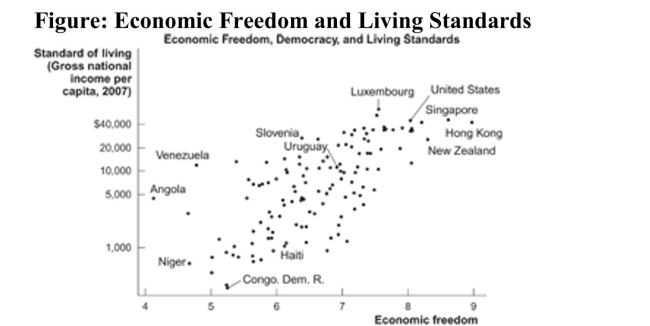Exam 19: Public Goods and the Tragedy of the Commons
Exam 1: The Big Ideas in Economics103 Questions
Exam 2: The Power of Trade and Comparative Advantage169 Questions
Exam 3: Business Fluctuations: Aggregate Demand and Supply114 Questions
Exam 4: Equilibrium: How Supply and Demand Determine Prices105 Questions
Exam 5: Elasticity and Its Applications153 Questions
Exam 6: Taxes and Subsidies100 Questions
Exam 7: The Price System: Signals, Speculation, and Prediction149 Questions
Exam 8: Price Ceilings and Floors199 Questions
Exam 9: International Trade78 Questions
Exam 10: Externalities: When the Price Is Not Right146 Questions
Exam 11: Costs and Profit Maximization Under Competition126 Questions
Exam 12: Competition and the Invisible Hand29 Questions
Exam 13: Monopoly144 Questions
Exam 14: Price Discrimination and Pricing Strategy152 Questions
Exam 15: Oligopoly and Game Theory127 Questions
Exam 16: Competing for Monopoly: the Economics of Network Goods51 Questions
Exam 17: Monopolistic Competition and Advertising143 Questions
Exam 18: Labor Markets148 Questions
Exam 19: Public Goods and the Tragedy of the Commons153 Questions
Exam 20: Political Economy and Public Choice151 Questions
Exam 21: Economics, Ethics, and Public Policy143 Questions
Exam 22: Managing Incentives140 Questions
Exam 23: Stock Markets and Personal Finance53 Questions
Exam 24: Asymmetric Information: Moral Hazard and Adverse Selection133 Questions
Exam 25: Consumer Choice141 Questions
Exam 26: Gdp and the Measurement of Progress135 Questions
Exam 27: The Wealth of Nations and Economic Growth155 Questions
Exam 28: Growth, Capital Accumulation, and the Economics of Ideas: Catching up Vs the Cutting Edge145 Questions
Exam 29: Saving, Investment, and the Financial System146 Questions
Exam 30: Supply and Demand183 Questions
Exam 31: Unemployment and Labor Force Participation96 Questions
Exam 32: Inflation and the Quantity Theory of Money165 Questions
Exam 33: Transmission and Amplification Mechanisms133 Questions
Exam 34: The Federal Reserve System and Open Market Operations144 Questions
Exam 35: Monetary Policy139 Questions
Exam 36: The Federal Budget: Taxes and Spending158 Questions
Select questions type
How are rational ignorance, special interest groups, and economic inefficiency related?
(Essay)
4.7/5  (44)
(44)
When a policy is highly visible, appears often in the newspapers, and has a major effect on the lives of millions of Americans, very often:
(Multiple Choice)
4.9/5  (41)
(41)
Why do you think voters choose to be rationally ignorant even when it is time to elect a new president? I. Voters are not presented with enough information to make a rational decision. II. Voters often believe that their vote does not make any difference in the political process. III. The process of understanding the electorate system, the candidates' platforms, and critically assessing the candidates' policies takes up more of the voter's time than it is worth.
(Multiple Choice)
4.9/5  (40)
(40)
As a predictive theory of politics the median voter theorem is applicable to almost all circumstances in politics.
(True/False)
4.8/5  (47)
(47)
Saying that voters are rationally ignorant is the same as saying voters are irrational.
(True/False)
4.8/5  (36)
(36)
Which of the following provides the most reasonable explanation for why agricultural interests lobby for higher farm subsidies and price supports?
(Multiple Choice)
4.9/5  (40)
(40)
Suppose that a special interest group makes up 0.5 percent of the population. If a policy transfers $600 to the special interest at a cost of $100,000 to society, will the special interest group lobby for this policy?
(Multiple Choice)
4.9/5  (33)
(33)
Large special interest groups tend to favor less efficient policies because they make up a large fraction of society.
(True/False)
4.9/5  (39)
(39)
If a policy transfers $100 to a special interest group at a cost of $4,000 to society, the group would lobby:
(Multiple Choice)
4.7/5  (35)
(35)
 Reference: Ref 19-3 (Figure: Economic Freedom and Living Standards) Refer to the figure. Based on the data in this chart, two countries that have about the same level of economic freedom but very different standards of living are:
Reference: Ref 19-3 (Figure: Economic Freedom and Living Standards) Refer to the figure. Based on the data in this chart, two countries that have about the same level of economic freedom but very different standards of living are:
(Multiple Choice)
4.9/5  (43)
(43)
Explain the assumptions behind the median voter theorem. In which cases will the median voter theorem NOT apply?
(Essay)
4.9/5  (27)
(27)
Politicians have a greater interest in serving the voters' will when:
(Multiple Choice)
4.9/5  (36)
(36)
Rational ignorance can be seen in which of the following scenarios?
(Multiple Choice)
4.8/5  (38)
(38)
Suppose you are in the middle of your senior year at school. An election comes up for the new student representatives to the school senate. The candidates are mostly sophomores. If elected these students will have powerful votes in the senate on matters that affect the student body. Do you have an incentive to be rationally informed?
(Essay)
4.8/5  (35)
(35)
Rational ignorance may cause voters to make irrational decisions, such as judging a politician based on the level of oil prices, even though markets set oil prices.
(True/False)
4.8/5  (37)
(37)
The greater the share of the population that is brought into political power, the more likely it is that policies will favor economic growth.
(True/False)
4.9/5  (39)
(39)
Which of the following would be the most likely outcome if a college professor awards grades based on average test scores and assigns the same grade to everyone in the class?
(Multiple Choice)
4.8/5  (36)
(36)
Sugar producers likely won't do much to oppose a law that reduces the supply of sugar and raises prices.
(True/False)
4.7/5  (41)
(41)
Showing 21 - 40 of 153
Filters
- Essay(0)
- Multiple Choice(0)
- Short Answer(0)
- True False(0)
- Matching(0)